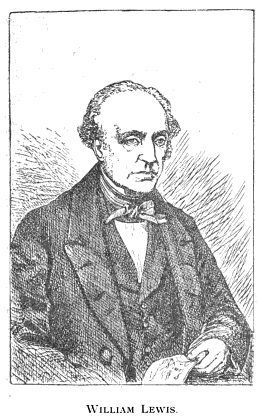William Lewis (chess player) facts for kids
William Lewis (born in 1787, died in 1870) was an English chess player and writer. He is known for a chess move called the Lewis Countergambit. Some people believe he might have been the very first player ever called a Grandmaster in chess.
Contents
Early Life and Chess Beginnings
William Lewis was born in a city called Birmingham. When he was young, he moved to London. There, he worked for a merchant for a short time.
He became a student of a chess player named Jacob Sarratt. Lewis later published a new version of Sarratt's chess book. This happened after Sarratt had passed away.
The Mechanical Turk and Travel
Around 1819, William Lewis was secretly the player inside the Turk. This was a famous machine that seemed to play chess on its own. Lewis played against many people and won.
He suggested to Johann Maelzel, who owned the Turk, that another chess player named Peter Unger Williams should be the next hidden player. When Williams played against the Turk, Lewis recognized his friend's unique chess style. Lewis then convinced Maelzel to tell Williams the secret of the machine. Later, Williams took Lewis's place inside the Turk.
In 1821, Lewis traveled to Paris with a Scottish player named John Cochrane. They played chess against a strong French player, Alexandre Deschapelles. Lewis won their short match.
Becoming a Chess Author
Lewis started his career as a writer around this time. He translated important chess books by famous players like Greco and Carrera. These translations were published in 1819 and 1822.
He was the main English player in a special chess match played by mail between London and Edinburgh in 1824. The Scottish team won this match. Lewis later wrote a book about it, explaining the games.
From 1834 to 1836, Lewis was part of the Westminster Chess Club's committee. This club played a chess match by mail against the Paris Chess Club. The English team, which included Lewis's students McDonnell and Walker, lost this match.
Chess Reputation and Teaching
William Lewis was very well-known as a chess player during his time. In 1838, a writer for a magazine called Bell's Life even called him "our past grandmaster". This might be the first time that word was used in chess!
Starting in 1825, Lewis kept his strong reputation by only playing opponents if he was given an advantage, like starting with an extra pawn. In the same year, he started a Chess Club. Here, he taught chess to students like Walker and McDonnell.
However, Lewis faced some tough times. In 1827, he went bankrupt because of bad investments in building pianos. His chess club had to close. The next few years were difficult for him. But in 1830, he found a job that gave him a stable income for the rest of his life.
With this new job, he could focus on writing his two most important books: Series of Progressive Lessons (1831) and Second Series of Progressive Lessons (1832). The first book was for beginners, teaching basic chess ideas. The second book went into detail about many different chess openings. In this book, the Evans Gambit was first described. This opening is named after its inventor, Captain Evans.
Later Years and Legacy
Lewis's chess books, along with those of his teacher Sarratt, helped change how people thought about chess. They moved away from older ideas and introduced new ways of playing.
As new, strong British players emerged, Lewis found it harder to beat them when playing on equal terms. Because of this, he slowly stopped playing chess actively.
After he retired from active play, he wrote more chess books. However, he was a bit isolated from the newest chess ideas. Because of this, his last big book, A Treatise on Chess (1844), was already considered "out of date" when it was published.
William Lewis passed away in 1870. He was buried in Highgate Cemetery in London. His grave does not have a headstone or marker.
 | James B. Knighten |
 | Azellia White |
 | Willa Brown |


